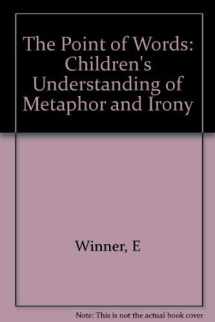
The Point of Words: Childrens Understanding of Metaphor and Irony
Book details
Summary
Description
A small child looks at a dripping faucet and says that it is drooling." Another calls a centipede a "comb." An older child notices the mess in his younger brother's room and says, "Wow, it sure is neat in here." Children's spontaneous speech is rich in such creative, nonliteral discourse. How do children's abilities to use and interpret figurative language change as they grow older? What does such language show us about the changing features of children's minds?
In this absorbing book, psychologist Ellen Winner examines the development of the child's ability to use and understand metaphor and irony. These, she argues, are the two major forms of figurative language and are, moreover, complementary. Metaphor, which describes and sometimes explains, highlights attributes of a topic. As such, it serves primarily a cognitive function. Irony highlights the speaker's attitude toward the subject arid presupposes an appreciation of that attitude by the listener. In contrast to metaphor, irony serves primarily a social function. Winner looks in detail at the ways these forms of language differ structurally and at the cognitive and social capacities required for each.
The book not only draws on the author's own empirical studies but also offers a valuable synthesis of research in the area: it is the first account that spans the realm of figurative language. Winner writes clearly and engagingly and enlivens her account with many vivid examples from children's speech. The book will appeal to developmental psychologists, educators, psychologists of language, early-language specialists, students of literature, indeed, anyone who is delighted by the fanciful utterances of young children.


We would LOVE it if you could help us and other readers by reviewing the book
Book review



